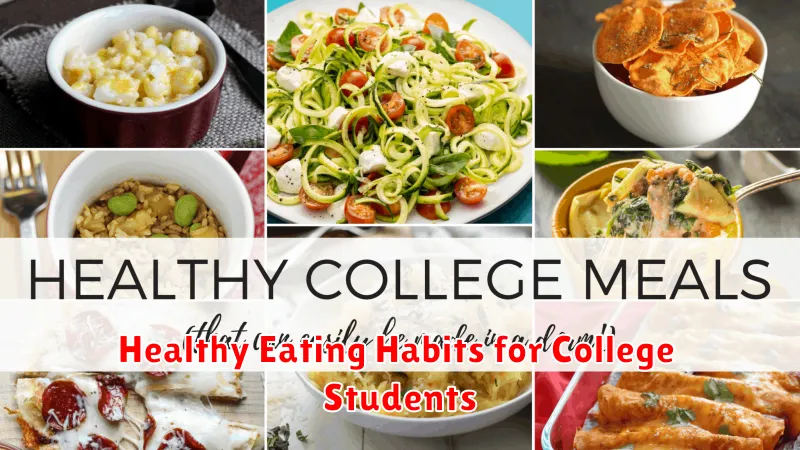College life presents unique challenges to maintaining healthy eating habits. Juggling demanding academics, extracurricular activities, and social life often leads to prioritizing convenience over nutrition. This can result in poor dietary choices, contributing to weight gain, decreased energy levels, and an increased risk of developing chronic health problems later in life. Developing healthy eating habits as a college student is crucial not only for academic success but also for overall well-being. This article will provide practical strategies and valuable insights to help you establish and maintain healthy eating habits throughout your college years.
Learning to navigate the dining hall, resist unhealthy temptations, and make informed food choices are essential skills for college students. This article will explore effective methods to cultivate healthy eating habits, including meal planning, grocery shopping on a budget, and making healthy choices in various dining situations. By incorporating these healthy eating habits into your routine, you can improve your physical and mental health, boost your energy levels, and enhance your academic performance, ensuring a successful and fulfilling college experience.
Importance of Balanced Meals
Maintaining a balanced diet is crucial for college students. A balanced meal provides the necessary energy and nutrients to support academic demands, physical activity, and overall well-being.
Consuming a variety of foods from all food groups ensures adequate intake of vitamins, minerals, and macronutrients. This helps improve concentration, boost energy levels, strengthen the immune system, and manage stress.
A balanced meal typically consists of lean protein, whole grains, fruits, and vegetables. Each component plays a vital role in supporting optimal health and academic performance.
Budget-Friendly Healthy Foods
Eating healthy in college doesn’t have to break the bank. By choosing nutritious, affordable staples, you can maintain a healthy diet on a student budget.
Prioritize items like:
- Oats
- Brown rice
- Eggs
- Canned beans (kidney, black, chickpeas)
- Frozen fruits and vegetables
These foods offer essential nutrients and are versatile enough for numerous meals. Buying in bulk when possible can also lead to significant savings.
Meal Prepping Basics
Meal prepping is a cornerstone of healthy eating, especially for busy college students. It involves preparing some or all of your meals in advance, saving you time and money while promoting healthier food choices.
Start by planning your meals for the week. Consider your dietary needs and preferences. Create a grocery list based on your meal plan to avoid impulse buys.
Dedicate a few hours each week to prepping. This could involve chopping vegetables, cooking grains, or portioning out snacks. Store prepped ingredients in airtight containers for freshness.
Smart Snacking Strategies

Smart snacking is crucial for maintaining energy levels and focus throughout the demanding college schedule. Avoid succumbing to unhealthy vending machine temptations. Instead, plan ahead and keep your dorm or apartment stocked with nutritious options.
Choose snacks that offer a combination of protein, fiber, and healthy fats to keep you feeling full and satisfied between meals. Some excellent choices include:
- Fruits (apples, bananas, oranges)
- Vegetables (carrots, celery, bell peppers) with hummus
- Greek yogurt
- A handful of nuts or trail mix
- Hard-boiled eggs
Portion control is also important. Pre-portioning snacks into bags or containers can help prevent overeating.
Navigating Dining Halls
Dining halls can be overwhelming with numerous food choices. Making healthy selections requires a strategic approach.
Start by surveying all available options before filling your plate. This allows you to make informed choices and build a balanced meal.
Prioritize fruits, vegetables, and lean proteins. These provide essential nutrients and help you feel full and energized. Choose whole grains over refined options.
Be mindful of portion sizes. Use smaller plates and avoid overfilling them. Listen to your body’s hunger cues and stop eating when you feel satisfied.
Limit sugary drinks and desserts. Occasional treats are fine, but make them an exception rather than the rule.
Hydration and Its Benefits
Staying properly hydrated is crucial for overall health and academic success. Dehydration can lead to fatigue, headaches, and difficulty concentrating, all of which can negatively impact academic performance.
Water plays a vital role in numerous bodily functions, including regulating body temperature, transporting nutrients, and removing waste products. Aim to drink at least eight glasses of water per day. Carry a reusable water bottle and refill it throughout the day. Choose water over sugary drinks like soda or juice, which can contribute to weight gain and other health problems.
Signs of dehydration include thirst, dry mouth, dizziness, and dark-colored urine. Pay attention to your body’s signals and drink water before you feel thirsty.
Avoiding Excessive Caffeine
Caffeine, a common stimulant found in coffee, tea, energy drinks, and even some snacks, can negatively impact sleep, increase anxiety, and contribute to heart palpitations when consumed in excess. College students often rely on caffeine to combat fatigue and meet academic demands. However, managing caffeine intake is crucial for maintaining overall health.
Moderate caffeine consumption is generally considered safe, with the FDA suggesting an upper limit of 400 milligrams per day for healthy adults. It’s important to be mindful of hidden caffeine sources and consider individual tolerance levels. Excessive caffeine can interfere with sleep patterns, leading to daytime fatigue and reduced academic performance.
Quick and Easy Healthy Recipes
College life often leaves little time for elaborate meal preparation. Prioritizing nutrition, however, is crucial for academic success. These quick and easy recipes will fuel your body and mind without requiring hours in the kitchen.
Breakfast
- Overnight Oats: Combine rolled oats, milk (dairy or non-dairy), chia seeds, and your favorite toppings (fruit, nuts, honey) in a jar and refrigerate overnight.
- Scrambled Eggs with Veggies: Whisk eggs with chopped vegetables like spinach, peppers, or mushrooms and cook in a pan until set.
Lunch/Dinner
- Lentil Soup: Canned lentils, broth, and diced vegetables simmered on the stovetop or in a slow cooker make a hearty and nutritious meal.
- Salad with Grilled Chicken/Tofu: A bed of greens topped with grilled protein and a variety of vegetables provides a balanced meal.
These recipes are adaptable and can be customized to your preferences and dietary needs. Remember to plan ahead and prep ingredients when possible to save even more time.
Dealing with Late-Night Eating
Late-night eating is a common struggle for college students, often leading to unwanted weight gain and disrupting sleep patterns. Managing this habit is crucial for maintaining overall health.
Plan ahead. Prepare healthy snacks in advance to avoid impulsive unhealthy choices. Fruits, vegetables, and yogurt are good options. If you’re studying late, portion out a sensible snack beforehand.
Hydration is key. Sometimes thirst can be mistaken for hunger. Drink a glass of water before reaching for a snack. It might be all you need.
Establish a cut-off time. Try to stop eating a few hours before bed. This allows your body time to digest before sleeping, improving sleep quality.
Maintaining Consistent Eating Habits

Maintaining consistent eating habits is crucial for college students’ overall well-being. A regular eating schedule helps regulate metabolism, energy levels, and concentration. Skipping meals can lead to overeating later, negatively impacting both physical and mental health.
Plan ahead and prepare meals and snacks in advance to avoid impulsive, unhealthy choices. Pack your lunch and bring healthy snacks to class to resist vending machine temptations. Even during busy study periods, prioritize short meal breaks to fuel your body and mind effectively.
Create a weekly meal plan to establish a routine. This aids in grocery shopping and reduces food waste. Consider prepping ingredients on the weekend for quick and easy weekday meals.

